Translate this page into:
Professor Paramoo Sugathan (1937-2024) and his times
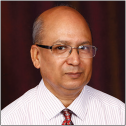
*Corresponding author: Devinder Mohan Thappa, Department of Dermatology and Sexually Transmitted Diseases, Jawaharlal Institute of Postgraduate Medical Education and Research, Puducherry, India. dmthappa@gmail.com
-
Received: ,
Accepted: ,
How to cite this article: Thappa DM. Professor Paramoo Sugathan (1937-2024) and his times. CosmoDerma. 2024;4:111. doi: 10.25259/CSDM_127_2024
Professor Paramoo Sugathan (h-index 8, with 246 citations) was born at Varkala in Trivandrum District of Kerala State in India [Figure 1]. He graduated from Trivandrum Medical College, Trivandrum, India, and did his postgraduate studies at All India Institute of Medical Sciences, New Delhi, India. He was trained under legendary teachers Professor B. M. Ambady (1912–1975) in Trivandrum, Professor L. K. Bhutani (1936–2004), and Professor K. C. Kandhari at AIIMS, New Delhi, and later under Professor T. Gopinathan (1931–2016) in Kozhikode, Kerala, India.
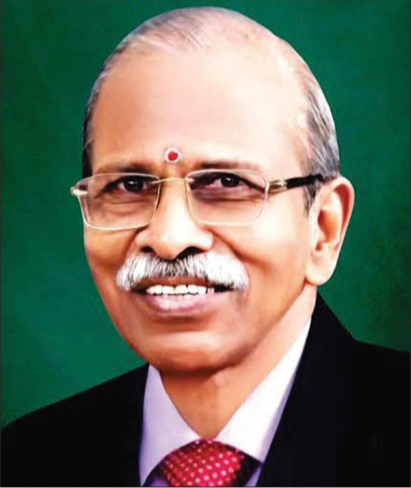
- Prof. P. Sugathan.
Prof. Sugathan studied under Prof. L. K. Bhutani who had succeeded Professor KC Kandhari as Professor and Head of Department, AIIMS, New Delhi, India in 1979.[1] Dr. Bhutani subsequently retired as Dean and Director of AIIMS, New Delhi, India, in 1996. He served as President of the Indian Association of Dermatologists, Venereologists, and Leprologists (IADVL) in 1981–1982. Dr. Bhutani was a keen researcher and prolific writer. He made major contributions to leprosy, pigmentation, porphyria, and sexually transmitted diseases. He served on the editorial boards of prestigious journals including the International Journal of Leprosy, Dermatological Treatments, and Seminars in Dermatology. His Color Atlas of Dermatology in 1982 and Color Atlas of Sexually Transmitted Diseases in 1986 are internationally acclaimed. Such was the aura of Prof. Bhutani during those times.[1]
Prof. Sugathan wrote the obituary of his teacher Dr. B. M. Ambady, a teacher of extraordinary capabilities.[2] Dr. Ambady played a leading role in the amalgamation of various dermatological societies of India into the unified IADVL in 1973 and was the national President of the IADVL during 1974–1975. The first annual conference of the association under the banner of the IADVL, independent of the Association of Physicians of India, was held in 1975 at Thiruvananthapuram, under the chairmanship of Dr. B. M. Ambady, and was extremely well received. He passed away on September 14, 1975. “The Ambadi Oration,” the most prestigious award in India to be annually presented to an Indian dermatologist, serves to introduce the legend Dr. Ambady to the new generation of dermatologists. And as the saying goes, “A teacher never dies.” Many of his qualities, as a teacher and as a doctor, have been imprinted into the minds of his colleagues and students, including me, Dr. P. Sugathan said. Prof. Sugathan also wrote the obituary of his another teacher Prof. Gopinathan.[3] He wrote, “On April 13, 2016, the dermatology fraternity in India woke up to a shocking news. The senior most teachers in dermatovenereology from Kerala, Dr. Thekkepat Gopinathan [1931–2016], left for his heavenly abode. It was his visionary zeal that marked the birth of the Indian Dermatology Online Journal. During casual chats on ACAD_IADVL, he mooted the idea of a journal in electronic format which would stimulate and provide a platform primarily to practitioners for reporting interesting clinical cases. The journal was meant to represent the rare and rich clinical material available in the Indian subcontinent. Through us, he lives.”
In an illustrious career spanning five decades, he served at various medical colleges across Kerala and left an indelible mark in the annals of Indian Dermatology. He retired as Professor and Head of Dermatology at Government Medical College, Kozhikode, and was a Senior Consultant at Baby Memorial Hospital, Kozhikode, till 2022. A passionate researcher, Prof. Sugathan’s notable contributions to medical literature include – Mudichood disease – the first Malayalam word in English medical literature,[4,5] a landmark paper on dermatitis cruris pustulosa et atrophicans,[6] and a keen work on Piedra. Through painstaking research, he has adorned the path of glory through mental grit, resilience, and perseverance. As a teacher and practitioner, he has always stood upright in discipline, integrity, and austerity. He has had a penchant for old values and practices while embracing the new with zeal. With a vast teaching experience of more than 25 years, he has guided a generation of dermatologists. Prof. Sugathan has been with IADVL, since its inception and served as the 2nd Secretary of IADVL, Kerala, India, in 1972–73 and 6th President of Kerala State IADVL in 1977.
He has won distinguished awards and has been recognized with the IADVL Best Teacher Award, Prof. V. N. Sehgal Award (2010), and Lifetime Achievement Award by Kerala State. He was invited to write a chapter on “Mudichood” in the book Essays in Tropical Dermatology by Prof. James Marshall of Stellenbosch University South Africa. His seminal paper on 1000 cases of Piedra was accepted for oral presentation at the World Congress of Dermatology in New Orleans, USA.
His autobiography titled “Jeevitha Panthaviloode” (Publisher: Green Books Pvt Ltd, Edition: 1, 2023, pages 228) has been well received by the community in general and the Dermatology fraternity in particular. He is married to Mrs. Savithri Sugathan and has a daughter and two grandchildren. An astute clinician, an inspiring teacher, a keen researcher, and an inquisitive thinker, Prof. Sugathan raised the standards of Dermatology and made Indian Dermatology proud. May your tribe increase! Considering his unparalleled contribution to Indian Dermatology, the IADVL conferred him the Lifetime Achievement Award on February 22, 2024, at DERMACON 2024, 52nd National Conference of IADVL held at Hyderabad, India [Figures 2–4]. A sage-like man who used to avoid the limelight despite being an ocean of knowledge. Today, a pillar of Indian Dermatology has fallen on his death on July 31, 2024.
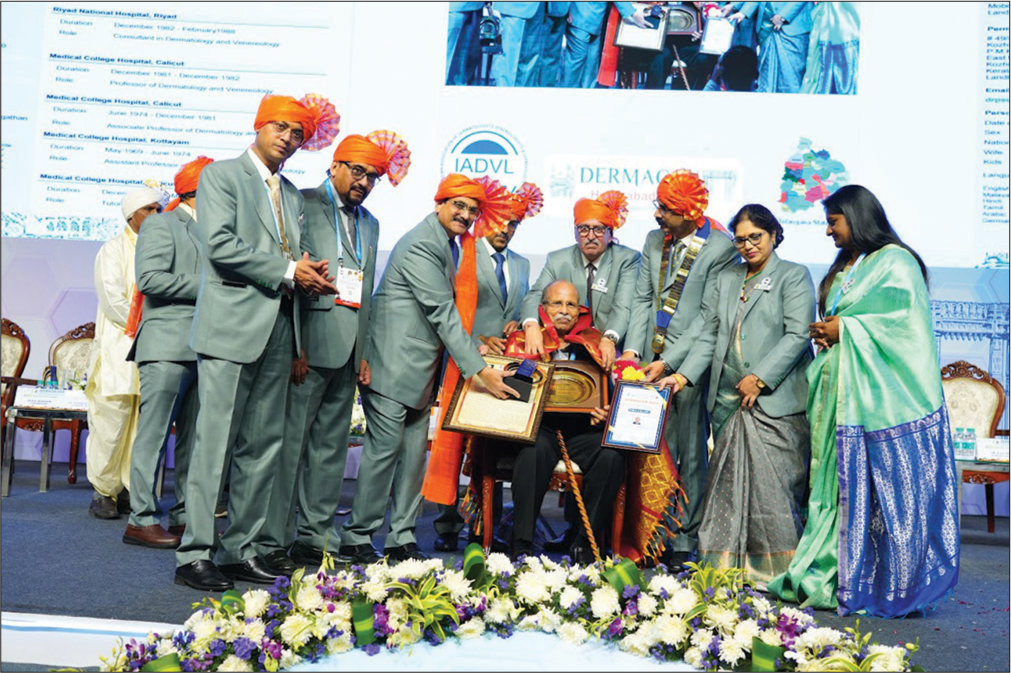
- Prof. P. Sugathan getting Lifetime Achievement Award at DERMACON 2024, at Hyderabad.
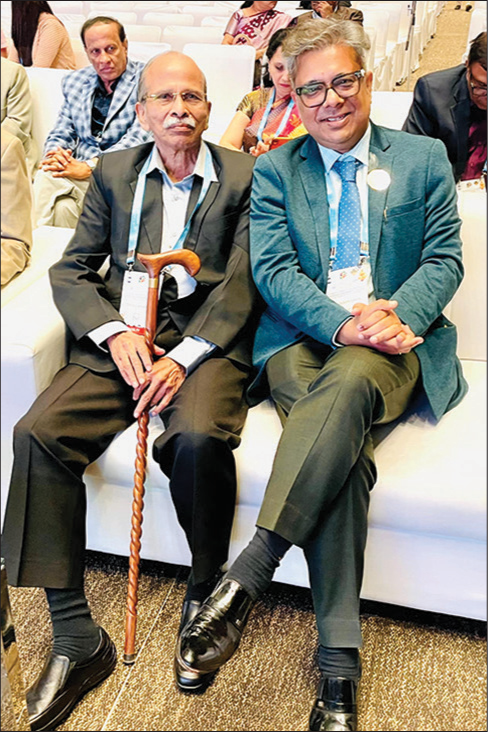
- Professor P. Sugathan with Dr. Koushik Lahiri in DERMACON 2024 at Hyderabad, India.
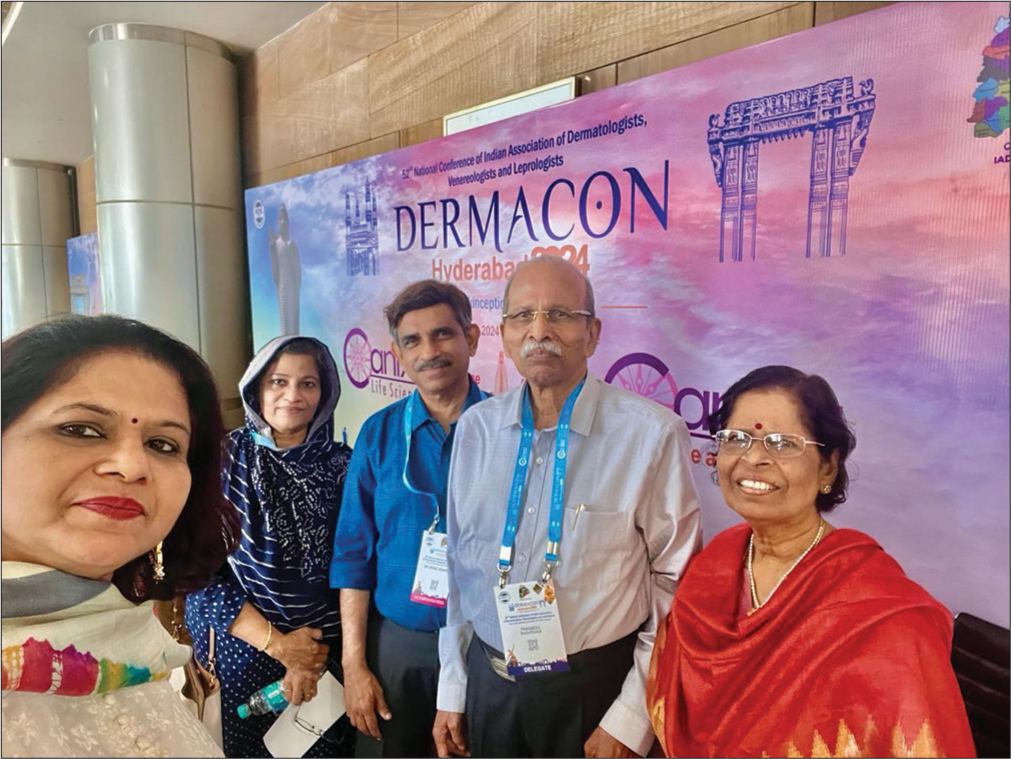
- Prof. P. Sugathan with his wife (Savithri), daughter (Anitha), Prof. Najeeba Riaz and his husband at DERMACON 2024 at Hyderabad during Lifetime achievement award ceremony.
Ethical approval
The Institutional Review Board approval is not required.
Declaration of patient consent
Patient’s consent was not required as there are no patients in this study.
Conflicts of interest
There are no conflicts of interest.
Use of artificial intelligence (AI)-assisted technology for manuscript preparation
The authors confirm that there was no use of artificial intelligence (AI)-assisted technology for assisting in the writing or editing of the manuscript and no images were manipulated using AI.
Financial support and sponsorship
Nil.
References
- Dr. LK Bhutani (05.09.1936-24.07.2004) Indian J Dermatol Venereol Leprol. 2005;71:67.
- [Google Scholar]
- Dr. B. M. Ambady: A teacher extraordinary. J Skin Sex Transm Dis. 2021;3:173-4.
- [CrossRef] [Google Scholar]
- Dr. Thekkepat Gopinathan (1931-2016) Indian Dermatol Online J. 2016;7:231-3.
- [CrossRef] [Google Scholar]
- Dermatitis cruris purstulosa et atrophicans. Int J Dermatol. 2012;51:357-8.
- [CrossRef] [PubMed] [Google Scholar]






